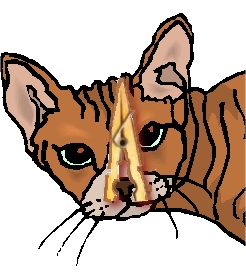The Feline Pheromone Phenomenon

Your cat has an extraordinarily good sense of smell. It is better than most dogs and much, much better than yours, feeble human. The basic figures show that cats have something like 150 to 200 million scent receptors in their nasal cavities. Humans get by with just five million. On top of these receptors, the feline brain is remarkably sophisticated at processing the information it gets from them.
As a complement to these extraordinary sensing abilities, cats are also sophisticated smell producers. From nose to tail a cat possesses a variety of glands designed for no other purpose than communicating with other cats. It is a language which is beyond our comprehension, yet nevertheless, one which we share with our cats.
The reason we share that language is because we smell. Actually, from a cat's perspective, we stink. However, unless that smell contains a high degree of nitrogen your cat probably does not mind. A powerful, complex smell has the same attraction for a cat as a lively colourful painting does for a human. (Cats don't like nitrogen because it is produced by the bacteria in rotten food. Sometimes cats will avoid what appears to be perfectly acceptable food to the human dishing it out – that's because the cat knows it's off, no matter what the 'sell by' date says on the label.)
One of the first things your cat did when she accepted you as her human was to get familiar with your scent signature. Testing has shown that cats can recognize the scent of a familiar human from almost half a kilometre away. Close up, a cat can also tell if you are happy and relaxed, or stressed and unhappy.
This is not just from the visual clues – your cat can tell all this just by hopping on to your sofa when you are not even in the room. This is because your body gives off a constant spray of chemicals called pheromones which signal your mood, the state of your health and the condition of your sex life. There's not a lot you can hide from your cat's nose.
This is why you should not be offended if your cat starts vigorously licking her fur on the place where you have just stroked her. She's not offended that you have marked her pristine pelt with your dirty mitts – rather she wants the scent clues that tell her where you've been, how you are feeling, and whether you have been cheating on her with other cats.
Your cat licks because unlike humans cats also have a scent organ on the roof of their mouths called the vomeronasal. Carrying a scent into its mouth (also done by gaping the mouth and inhaling like a connoisseur with a good wine) is another way for a cat to get background information. If you have handled another cat, not only does your cat know that instantly, she also knows the approximate age, sex and eating habits of that cat. When two cats that know each other meet after an absence, however brief, they will probably smell each other's faces and backsides. This is the feline equivalent of not only asking 'How are you? What have you been up to?' but of getting a very comprehensive answer as well.
This is why your cat is fond of rubbing against you, especially with her head. As the cat rubs it produces pheromones from facial glands that mark you with your cat's special scent. Your cat will also mark furniture and other household objects with that smell. The message for other cats says 'this is mine'. Your shared scent marks you and the cat as members of the same household.
As a further bonus scent marking also means that your cat can navigate around the house even in pitch darkness,navigating by the intensity of her smell combined with that of the objects she has rubbed against. Cats also have scent glands on the pads of their feet. This is one reason why an insecure cat might claw the furniture – she is making every effort to reassure herself that this is her place in the world.
A more aggressive form of marking comes from the anal glands and urine. Cat urine has a very distinctive odour, because cats use it to mark their territory. The original compounds are powerful enough, but they slowly degenerate into something even more pungent. The end result tells interested feline visitors not only all they need to know about the cat that deposited the scent marker, but also how long ago that marker was deposited. (It is also why, if your indoor cat strays outside, you should put out her litter tray as well. There's nothing like the sweet scent of home to point a confused cat in the right direction.)
You can find more about cat smell here
